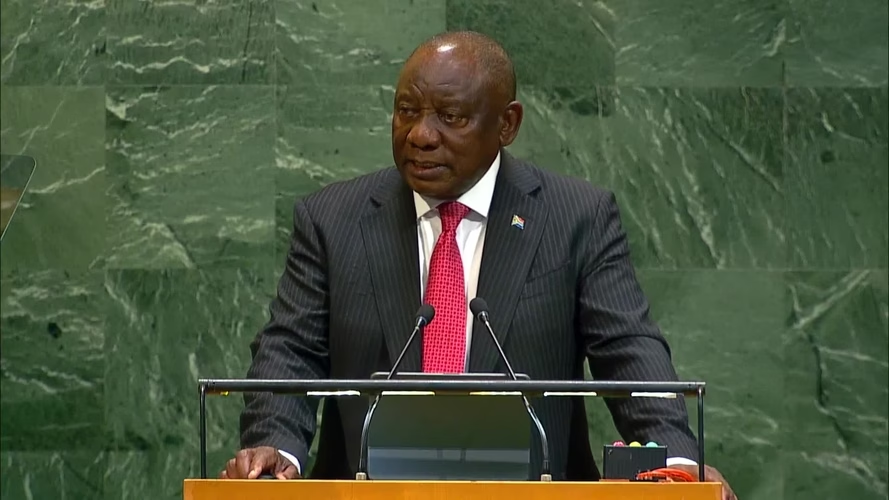South African President Cyril Ramaphosa has urged world leaders to act with urgency and unity in tackling the overlapping global crises of conflict, climate change, inequality, and the erosion of international law. Speaking at the 80th Session of the United Nations General Assembly in New York, he positioned South Africa’s upcoming presidency of the G20 as a moment to centre Africa in global decision-making.
South Africa’s G20 Presidency
Ramaphosa emphasised that South Africa’s chairing of the G20 in 2025 would be driven by the theme “Equality, Solidarity and Sustainability”. He stressed that this is not a symbolic phrase but a practical call for global reform.
“To give full meaning to our theme, we have invited the G20 countries to join us in prioritising disaster resilience, debt sustainability, a just energy transition, and critical minerals beneficiation at source, to foster inclusive growth and sustainable development.”
As part of this agenda, the President announced the establishment of an Extraordinary Committee of Independent Experts on Global Wealth Inequality. Chaired by Nobel laureate Professor Joseph Stiglitz, the committee will deliver its first report to G20 leaders in Johannesburg this November.
Debt Burdens and Economic Inequality
Ramaphosa noted that many developing countries, particularly in Africa and the Global South, are carrying unsustainable debt burdens.
“Many countries with developing economies, especially in Africa and the Global South, do not have adequate capital to finance their development goals,”
he said.
“They are indebted and are paying much more on debt servicing than they do on health and education.”
He urged reforms to international financial institutions to create fairer lending conditions for low-income economies.
Climate Change and Development Reversals
Ramaphosa warned that climate change continues to undermine development, especially in vulnerable regions. He reminded the Assembly that Africa contributes least to the crisis but suffers some of its most devastating consequences.
“Although Africa carries the least responsibility for climate change, many countries on the continent experience much of its harshest effects,”
he said.
“Extreme weather events, like floods and droughts, are driving food insecurity, displacing populations, damaging infrastructure and destroying livelihoods.”
Trade and Multilateral Reform
The President criticised the use of trade as a tool of geopolitical confrontation, reiterating South Africa’s call for reforms to the multilateral trading system.
“Trade is now being used as a weapon against a number of countries in the world,”
he said.
He called for the lifting of the United States’ decades-long embargo on Cuba, describing it as unfair.
“This unfair embargo must be lifted – and we want it lifted sooner rather than later.”
He contrasted this with positive examples, highlighting the African Continental Free Trade Area (AfCFTA) as a symbol of constructive cooperation. The AfCFTA, he said, could become the central pillar of Africa’s economic integration.
Security, Humanitarian Crises and International Law
Ramaphosa expressed deep concern over the weakening of multilateral institutions and the disregard for international law, particularly in conflict zones.
“We are fighting wars that cause death and destruction when we should be fighting poverty and developing the livelihoods of vulnerable people.”
He was critical of the United Nations Security Council’s inability to respond effectively to conflicts in Gaza, Sudan and the Democratic Republic of the Congo.
“The United Nations Security Council has proven to be ineffective in its current form and composition in carrying out its Charter mandate to maintain international peace and security.”
Gaza and Palestine
On Gaza, Ramaphosa delivered one of his strongest statements.
“There is growing global consensus that Israel is committing genocide in Gaza,”
he said.
He cited a recent United Nations Independent International Commission of Inquiry report which found that Israel is responsible for genocide.
“South Africa has acted in the interest of saving lives by insisting that the International Court of Justice should make a ruling that, indeed, genocide is being committed in Gaza and that it should stop. And we stand here to say: it must stop.”
Ramaphosa welcomed increasing global recognition of the State of Palestine.
“The long-overdue announcement by an increasing number of countries to recognise the State of Palestine is testament to this determination.”
Nuclear Disarmament and Gender Equality
Looking ahead, Ramaphosa confirmed that South Africa will preside over the first Review Conference of the Treaty on the Prohibition of Nuclear Weapons in 2026.
“There is no greater assurance of non-proliferation than the complete prohibition of nuclear weapons.”
He also reaffirmed South Africa’s commitment to gender equality and marked the 30th anniversary of the Beijing Declaration.
“We would support also the election of a female Secretary-General of the United Nations.”
Reforming the United Nations
Ramaphosa concluded with a strong appeal for United Nations reform, saying Africa and South America deserve full representation on the Security Council.
“We can no longer accept that a large portion of the world’s population is not represented in the United Nations Security Council. My own continent, Africa, home to 1.4 billion people, as well as South America, are not represented. This is unjust. This is unacceptable. And it must end.”
He emphasised that the struggle for justice and representation is not merely political but about the very essence of human freedom.
“We must rise to the occasion and do our utmost together to ensure the political, economic, and social freedom of all humanity. We must reaffirm that freedom is indivisible and that the denial of the rights of one person diminishes the freedom of all of us.”

















